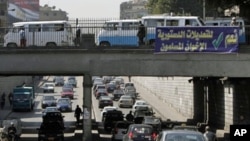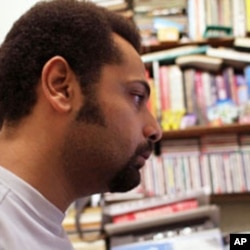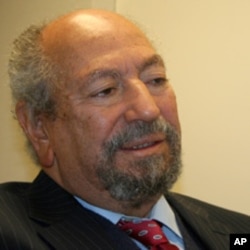It was only five weeks ago that Hosni Mubarak stood down from nearly 30 years of autocratic rule. In this continual breakneck pace of change, Egyptians go to the polls Saturday in the first major test on their road to democracy. They will decide on a series of eight amendments to the recently-suspended constitution.
Most of the changes focus on the most contentious aspects of the country’s electoral process: They define presidential term limits and powers; provide for the judiciary to monitor and supervise elections; they stipulate who can - and cannot run. They do away with voter registration and allow anyone with a national identity card to vote. In addition, they call for a new constitution to be written sometime down the road.
Early Doubts
Egyptians are debating whether this weekend’s referendum comes a little too soon. At the same time, they recognize what a milestone it is in their recent history - because for the first time in decades, they have the opportunity to vote freely on a matter.
When Egypt’s Military Council took power last month, it dissolved both houses of parliament, suspended the constitution and scheduled parliamentary and presidential elections for June and August, respectively. The Council then appointed a committee of eight legal experts to amend the current constitution. Heading the group was Tariq El Bishri, 78, a respected judge and advocate for judicial independence. Conspicuously absent from the group were any of the pro-democracy advocates of the January 25 or any other opposition movement.
Reservations about the process
Wael Abbas is among Egypt’s best known cyber journalists and activists, and one of the winners of the 2007 Knight International Journalism award for his work tracking police abuse. Like most pro-democracy advocates, he says the military’s timetable is so rushed that it doesn’t give new parties time to organize - and therefore practically hands over a new government to either the Muslim Brotherhood or remnants of the old regime.
He says Egypt should have thrown the old constitution away and written a new one. He’s calling for Egyptians to vote “no.”
|
Among the most critical changes called for in the proposed amendments:
|
“I don’t like the amendments,” said Abbas. “I didn’t like the committee when they started it. It was started during the regime of Mubarak. Mubarak was behind the choice of the people on the committee - and the Army also."
"The changes that they made to the constitution are not satisfactory at all. They don’t promise a new constitution, once there’s a president and a parliament. And also, they did not take any powers from the president and didn’t give any power to the parliament."
A great many Egyptians say they would have preferred an entirely new constitution, however, they concede that the amendments at least satisfy the basic demands of the people.
'Yes' to amendments
Dr. Saad Eddin Ibrahim, founder of the Ibn Khaldun Center for Development Studies, was jailed, tortured and exiled under the regime of Hosni Mubarak. All in all, he says he is satisfied with the proposed changes.
“The most important one,” he said, “is the limitation on presidential terms. That’s very important to avoid the kind of scenario we had in Egypt in the past and the kind of scenario other countries in the Middle East have, where a president comes to power and stays on and on and even tries to pass it on to his children. My thought is, under the circumstances, I would say ‘yes’ to all the amendments.”
Ibrahim admits that one of the proposed amendments regarding citizenship would hurt him personally, if he ever decided to run for president. He holds an American passport and is married to an American.
No Plan "B"
Ellis Jay Goldberg, Professor of Political Science at the University of Washington in Seattle, is currently Visiting Professor of Political Science and Middle East Studies at the American University in Cairo. He believes the Egyptian military has not been at all clear about what happens next if the amendments pass, fail or if voters boycott the referendum Saturday.
“The presumption is that if people vote ‘yes’ and accept the amendments,” Goldberg said, “the army will reinstate the constitution and it will schedule elections. It’s not clear at this point if it will schedule elections for a parliament first or for the presidency first. At some point, the parliament will be called into session and it will choose a constituent assembly which will then write a new constitution.”
Goldberg said it is equally unclear what will happen if the amendments fail. “What people have been threatened with, essentially, is that if they vote no, then the army will simply remain in control, continue to rule and Egypt will be ruled by a military government for some unspecified period of time. That’s clearly unacceptable.”
'Like a true democracy'
Preliminary polls indicate public opinion on the constitutional amendments is almost evenly divided. Saad Eddin Ibrahim considers this to be very good news as past referenda in Egypt nearly always had close to 100 percent approval. Today, says he, the result is impossible to predict.
“Something like 52 to 48, which is unusual,” Ibrahim said. “This is like a true democracy, where people do disagree and the disagreement is close to the middle!”
With the vote only days away, many details remain up in the air. The military has not yet released the specific locations of polling stations on its official website. It does say there will be 54,000 polling stations to serve 45 million eligible voters. If voter turnout is high, keeping elections smooth and orderly could end up a logistical nightmare for police. Finally, it is not clear who will be monitoring the election or counting the votes, once they are in - this, in a country with a reputedly long history of voter fraud and rigged elections.
Whether Egyptians can successfully navigate this first major democratic test is anyone’s guess. But if Egyptians have done anything in the past few weeks, they have proven that they know how to make what was once unimaginable possible.







